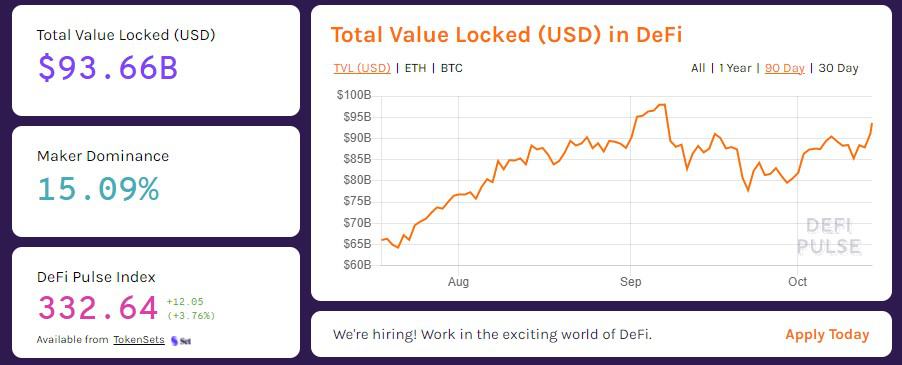Pollen DeFi: Democratizing Investments in Decentralized Finance
[Featured Content]
The field of Decentralized Finance continues to expand as more and more teams are building various applications aimed at solving different challenges existing in the traditional financial world.
In September 2021, the total value locked in DeFi protocols hit just shy of $100 billion, providing further merit to the notion that there’s a huge demand for these services.
The crux of decentralized finance is to democratize access to financial services for people across the world. It’s a notion that many in the cryptocurrency community share and believe that it’s the reason for which DeFi is the future in finance.
Completely in line with the essence of the industry, Pollen DeFi brings forward a next-gen platform where members of the community manage portfolios represented by asset pool tokens. The closest parallel in the traditional financial space is the largest and most popular financial vehicle, the managed fund. Pollen DeFi is creating the first next-gen tokenized asset portfolio managed by its community, not unseen money managers.
What is Pollen DeFi?
Pollen DeFi is an asset management tool designed to allow communities to create and manage crypto asset portfolios, working with the collective intelligence of the community to make the best decisions and achieve the best outcomes.
It’s a community-powered DAO that allows users to make recommendations that influence the portfolio and the asset pool tokens that represent that portfolio. There will be a governance token, Pollen (PLN) token. Holders of the governance token can use the platform to either actively propose portfolio management decisions or simply delegate their power to those who have established a good reputation score on the platform for doing so.
Pollen DeFi describes itself as a DeFi 2.0 project. It seeks to create a platform that encourages use by a much broader audience than products typically seen in the DeFi space, which tends to have a high barrier to entry in terms of understanding what the products do and how to use them. Creating an enjoyable user experience, prioritizing professionalism in design and communication, and making it clearly understood what the platform actually does are key focus points for the team.
The platform has been in Alpha. However, in a press release shared with CryptoPotato, the team has identified the critical market and consumer sentiment conditions for DeFi 2.0 style projects and has revealed the launch roadmap, which aims to bring the project out of stealth in October.
Speaking on the matter was Philip Verrien, Project Lead and Co-Founder of Pollen DeFi, who said:
“DeFi Summer showed the potential for a fully decentralized financial system. The technology was in its infancy and only those with a large risk appetite and technical smarts engaged. Through all the noise, we identified the need for easily accessible, mature decentralized financial products with appeal to a broader audience. The next generation of DeFi. We have been building what we believe will be the central DeFi 2.0 product: the first truly decentralized asset management protocol, Pollen DeFi. It will challenge the way people approach their crypto portfolio and give them dynamic new options.”
How Does the Protocol Work
To understand how the protocol works, users need to know the various participants in the ecosystem.
Traders represent the core community members who are well-versed in the industry and work towards shaping the asset portfolio in a way that benefits the entire community. The more profitable their proposals are, the stronger their community standing will become. This voting power will influence the index and earn them more Pollen (PLN) governance tokens.
The passive delegators are users who don’t have the time or knowledge to make portfolio recommendations and earn the reputation points that the more active traders do. They can delegate their voting power based on merit and, in turn, earn PLN governance tokens passively as well as accessing a managed asset portfolio by holding asset pool tokens.
Initially, the Pollen DeFi community will be focused on managing the Portfolio Asset Index (PAI) token. However, after the mainnet launches, other communities will be able to create their very own tokenized asset pools. This allows for influencers and professional traders to set up groups and create branded asset pools and should make Pollen DeFi a hub of the decentralized finance ecosystem.
Pollen DeFi’s Native Tokens: PLN and PAI
There are two tokens that are important for the Pollen DeFi ecosystem.
- Pollen token (PLN)
PLN is the governance token, and it has a lot of mechanics that build on the reputation of active users and scales their voting power accordingly. Before launch, the PLN token will be available to the public through a launchpad, to be announced later in October.
- Portfolio Asset Index token (PAI)
PAI is the token that represents the portfolio of assets managed by the Pollen DeFi ‘hive mind’ community. It’s designed to be a lot less volatile and take the space between a cryptocurrency asset and a stablecoin – it’s designed to be a native DeFi asset with ‘DeFi lego’ growth prospects.
It is intended to offer a hedge in times of volatility without having to exit the market, and it’s also not pegged to anything, unlike stablecoins.
PAI will be launched on the release of mainnet in Q1 2022. Other asset pool tokens will be launched by communities afterward as per the roadmap.
In essence, Pollen DeFi is building an innovative platform, anchoring its foundations to a few simple yet powerful principles – collective intelligence, token Darwinism, and harvesting and activating community knowledge with technology.
The team plans to announce a partnership with an IDO launchpad on 19th October 2021, and users can follow the updates on the official Pollen Defi Twitter page.
OhNoRipple via https://www.ohnocrypto.com/ @Danish Yasin, @Khareem Sudlow

